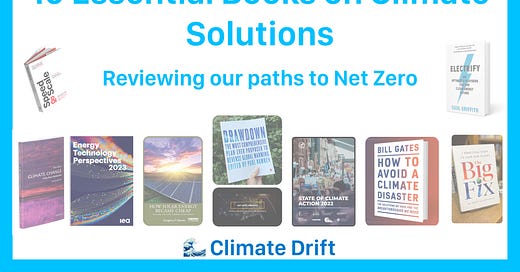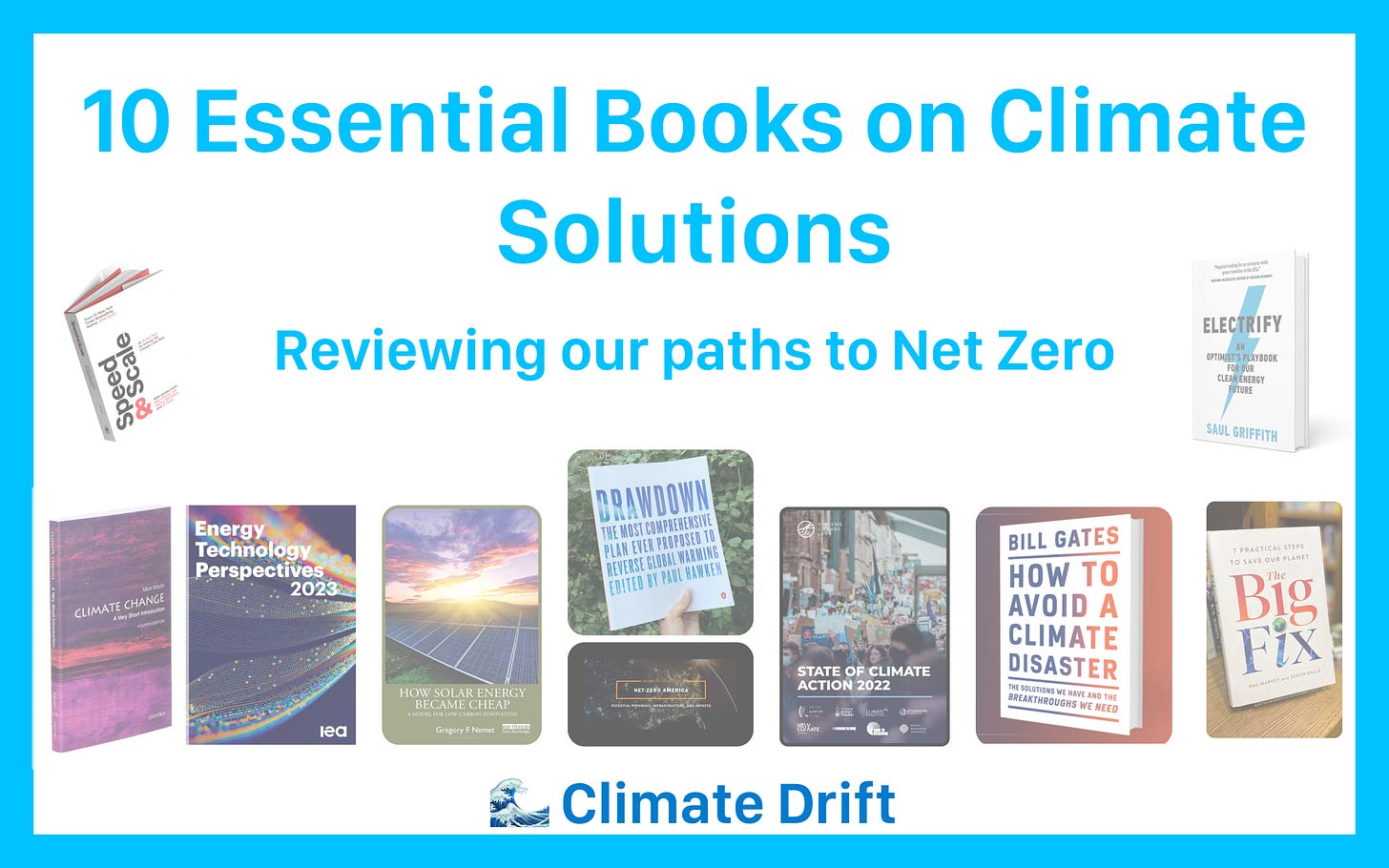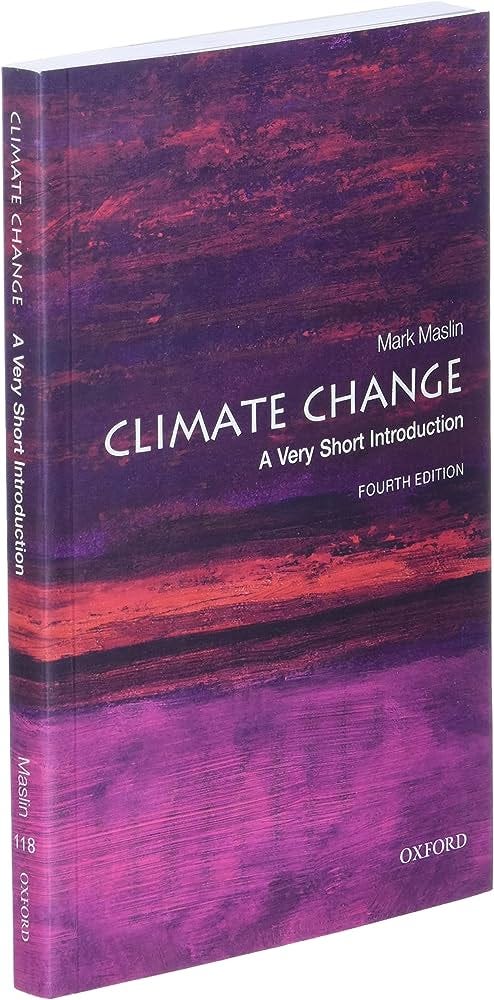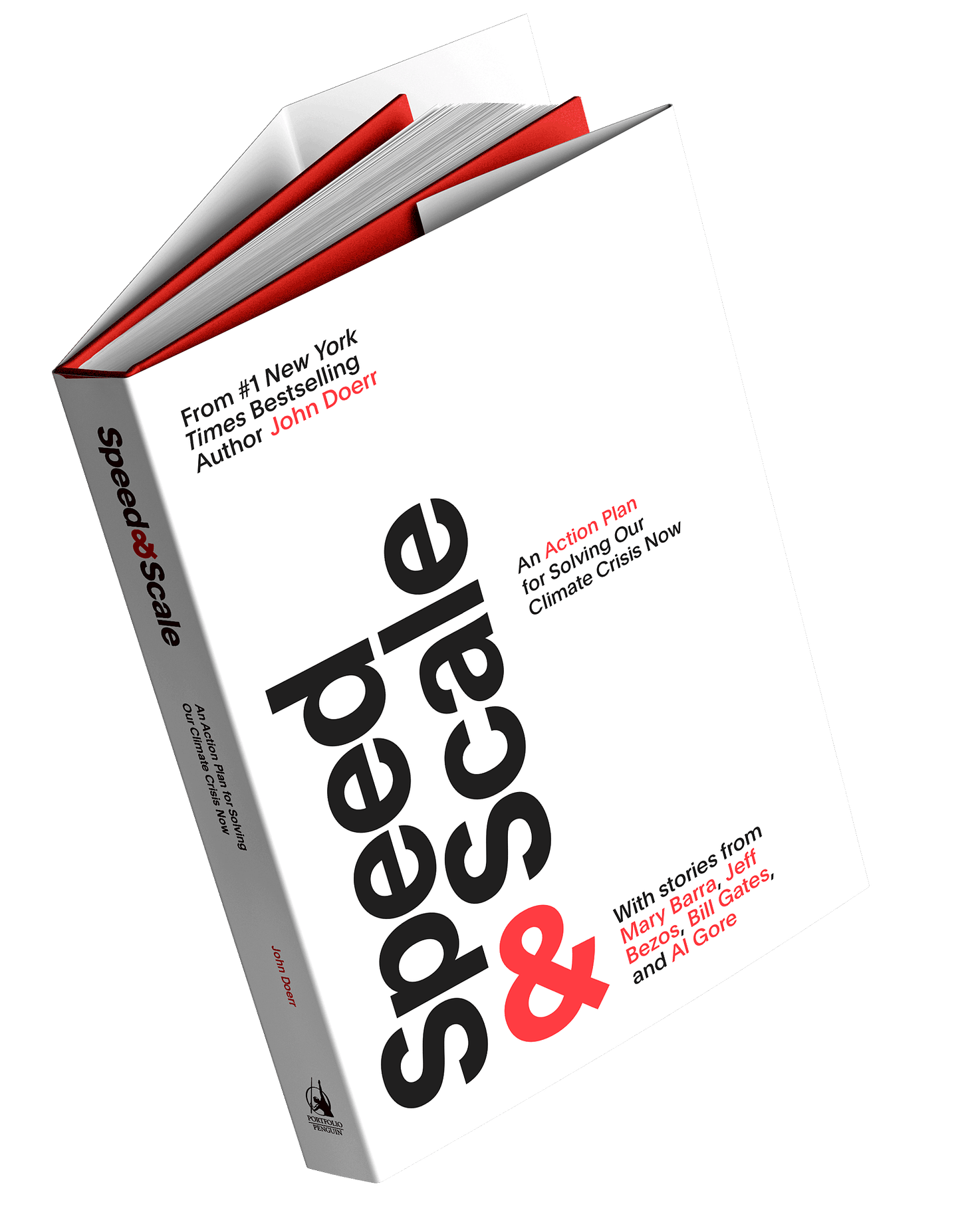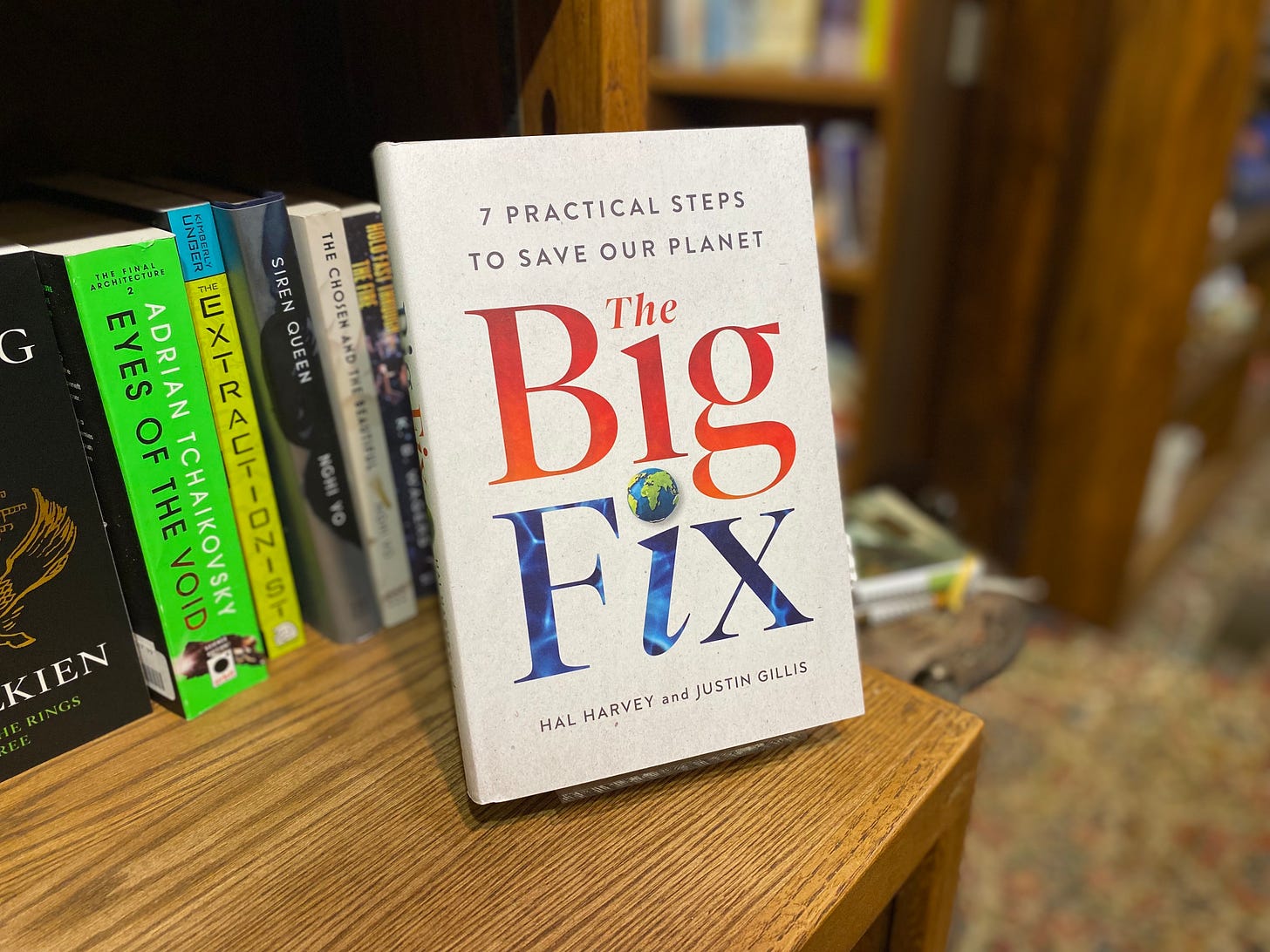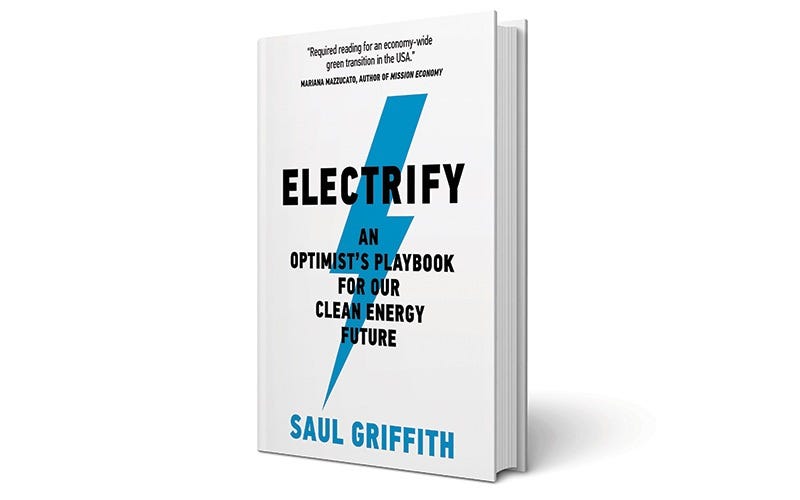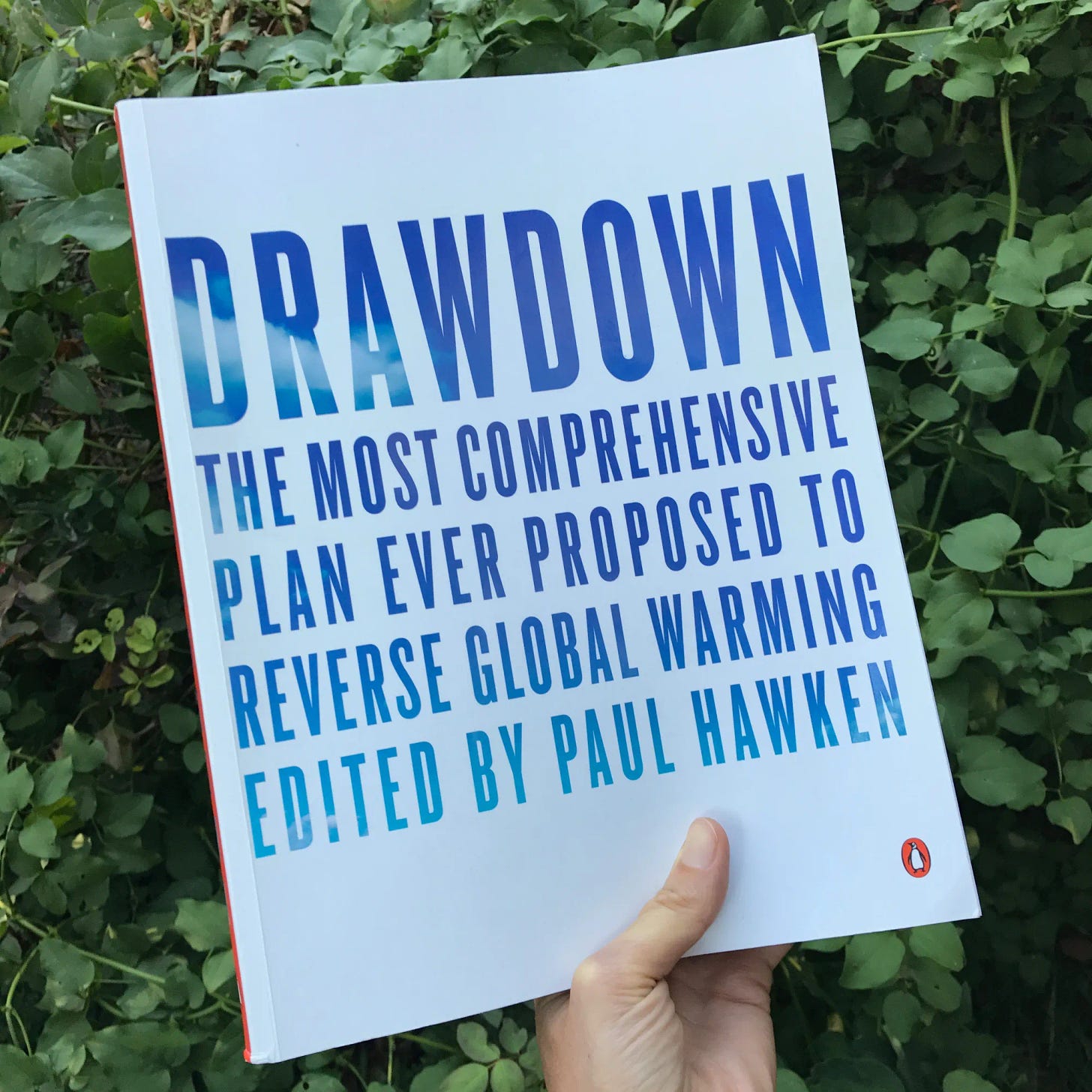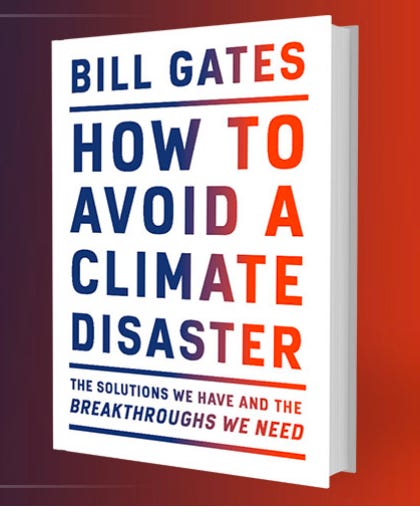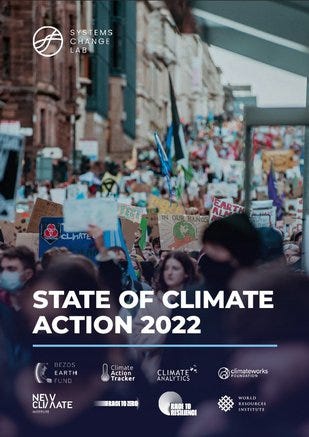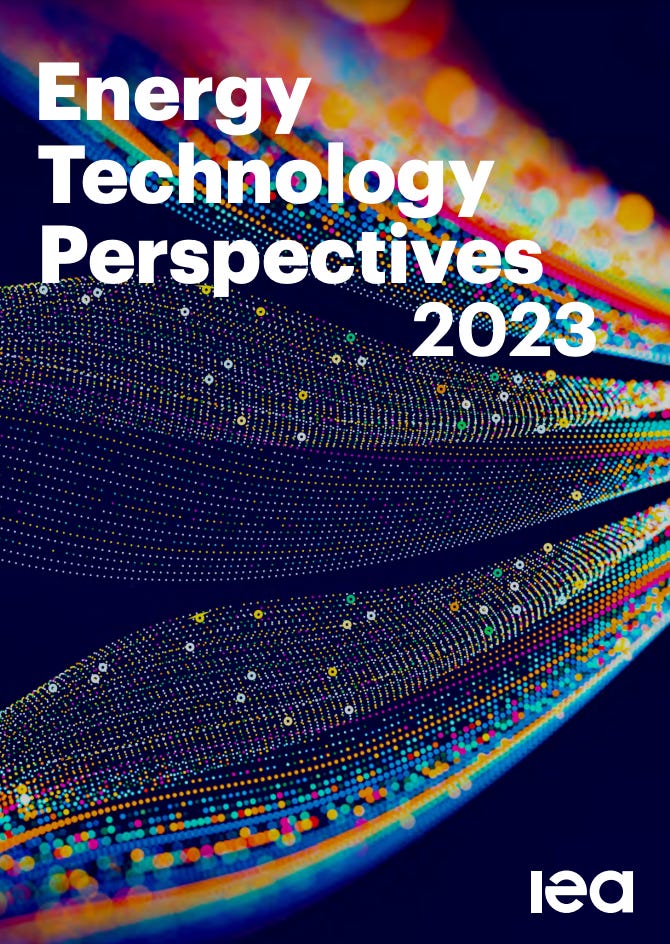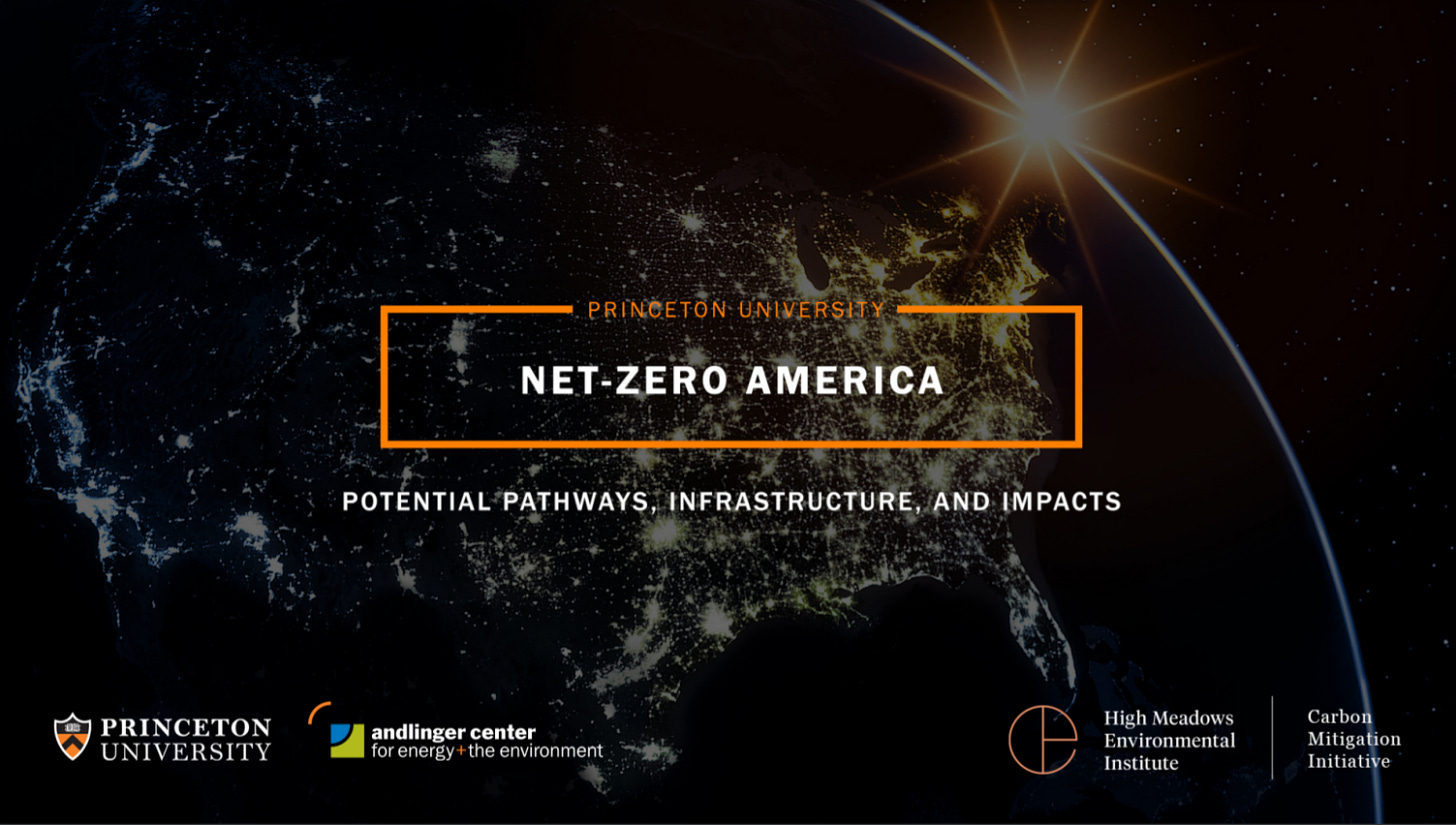Discover Climate Drift - the hub for navigating climate solutions and uncovering your role in the pursuit of net zero emissions.
If you haven't yet, why not join our trailblazing community by subscribing here:
Hey there 👋 !
Skander, here.
Dozens of frameworks aim to explain our way to Net Zero emissions, with experts from various fields tackling the challenge from different angles.
Although no single framework is perfect, each one provides a unique approach and insights.
Below, you'll find a our list of the top 10 frameworks.
This time, we're doing something new for our subscribers: we're giving away 10 bundles of books on all the frameworks. Simply subscribe for a chance to win.
As the path forward becomes increasingly clear, let's explore how these frameworks are defined and see what we can learn from them.
Time to dive in. 🌊
Climate Change - A Very Short Introduction by Mark Maslin
TLDR: Short Summary of the scientific consensus on Climate Change and its history & future, updated to the 2021 IPCC, by Mark Maslin, a leading Professor on Climate.
This book draws on the latest science from the 2021 IPCC report, examining the evidence that climate change is already happening and discussing its potential catastrophic impacts in the future. The author, Mark Maslin, explores the geopolitics of climate change and the win-win solutions we can employ to avoid the very worst effects of climate change.
Link to Amazon:
https://www.amazon.com/Climate-Change-Short-Introduction-Introductions/dp/0198867867
Speed & Scale: An Action Plan for Solving Our Climate Crisis Now by John Doerr and Ryan Panchadsaram
TLDR: 10 step OKR framework on solving Climate Change, with current climate tech examples, by John Doerr and Ryan Panchadsaram
The book outlines an urgent 10-step strategy aimed at reducing greenhouse gas emissions to net zero by 2050, a critical global target to preserve a habitable planet for those who come after us. These steps encompass everything from transforming our energy system to electricity to revamping the worldwide food supply chain and extracting carbon directly from the atmosphere.
Link to Amazon:
https://www.amazon.com/Speed-Scale-Action-Solving-Climate/dp/0593420470
The Big Fix: Seven Practical Steps to Save Our Planet by Hal Harvey and Justin Gillis
TLDR: Hal Harvey's framework outlines the necessary tasks and policy initiatives that are effective in combating climate change.
"The Big Fix" is a practical guide that presents seven urgent changes that can make a significant difference in combating climate change. The authors, Hal Harvey, an energy policy advisor, and Justin Gillis, a longtime New York Times reporter, argue that the fight against climate change involves more than just individual actions like installing smart thermostats or eating plant-based meat. They delve into the big decisions that affect our climate, from the type of power plants we build to the efficiency standards for cars.
Link to Amazon:
https://www.amazon.com/Big-Fix-Seven-Practical-Planet/dp/1982123990
Electrify: An Optimist's Playbook for Our Clean Energy Future by Saul Griffith
TLDR: "Electrify" is a detailed and optimistic action plan for combating climate change by electrifying everything, while creating new jobs and a healthier environment.
The author, Saul Griffith, an engineer and inventor, presents a simple yet powerful idea: electrify everything. He outlines what it would take to transform our infrastructure, update our grid, and adapt our households to make this possible. The book doesn't rely on big, not-yet-invented innovations but on thousands of little inventions and cost reductions. Griffith's plan also includes creating up to twenty-five million jobs, making it an attractive proposition for a world recovering from a pandemic and economic crisis.
Link to Amazon:
https://www.amazon.com/Electrify-Optimists-Playbook-Energy-Future/dp/0262545047
How Solar Energy Became Cheap: A Model for Low-Carbon Innovation by Gregory F. Nemet
TLDR: "How Solar Energy Became Cheap" provides a comprehensive explanation of how solar energy, once a costly way to produce electricity for satellites, has become an inexpensive and substantial global industry.
The author, Gregory F. Nemet, draws on developments in the US, Japan, Germany, Australia, and China to provide a truly international perspective. The book not only explores the success of solar energy but also uses it as a model for innovation in other low-carbon technologies. Nemet suggests that the lessons learned from solar energy's success can be applied to other technologies needed to address climate change, such as small modular nuclear reactors and direct air capture.
Link to Amazon:
https://www.amazon.com/How-Solar-Energy-Became-Cheap/dp/0367136597
Drawdown: The Most Comprehensive Plan Ever Proposed to Reverse Global Warming by Paul Hawken
TLDR: "Drawdown" is a groundbreaking book that offers a comprehensive plan to address global warming.
Published in 2017 by Project Drawdown, this work has emerged as a foundational text on climate solutions. Drawing from a collective understanding of methods and technologies that have the potential to reverse atmospheric carbon accumulation by the middle of the century, the book's solutions have left an imprint on various sectors. They've shaped university courses, municipal climate strategies, corporate pledges, community efforts, and philanthropic approaches. Remaining a sturdy and pertinent guide for grasping and enacting climate solutions, for the latest analysis and insights, the authors recommend "The Drawdown Review 2020".
How to Avoid a Climate Disaster: The Solutions We Have and the Breakthroughs We Need by Bill Gates
TLDR: In "How to Avoid a Climate Disaster", Bill Gates delivers an actionable plan to combat climate change, drawing on his tech expertise and philanthropic work.
Bill Gates begins with the stark reality that the world emits 51 billion tons of greenhouse gases annually and outlines the complex path to reducing that number to zero. He explores the five main sources of emissions, the costs of neutralizing them, the pivotal role of governmental policies, and offers specific strategies for getting to net zero.
State of Climate Action 2022
TLDR: This report guides the allocation of 10 billion USD by the Bezos Earth Fund, outlining priorities and investment areas.
The "State of Climate Action 2022" report is a collaborative effort by various organizations, including the Bezos Earth Fund, Climate Action Tracker, Climate Analytics, the United Nations High-Level Climate Change Champions, and the World Resources Institute.
The report provides a comprehensive assessment of the global gap in climate action, highlighting the progress and areas where acceleration is needed. It assesses 40 indicators of systems change and finds that none are on track to reach their 2030 targets. While some indicators show promising progress, others are well below the required pace, and some are even heading in the wrong direction.
Link:
https://www.wri.org/research/state-climate-action-2022
Energy Technology Perspectives 2023
TLDR: The "Energy Technology Perspectives 2023" (ETP-2023) report by the International Energy Agency (IEA) provides a comprehensive analysis of the current state of global clean energy supply chains.
The report underscores the dawn of a new industrial era, concentrating on the burgeoning clean energy technology manufacturing sectors such as solar PV, wind, electric vehicles (EVs), and batteries.
ETP-2023 delves into diverse aspects ranging from mining to the production of essential materials like lithium, copper, nickel, steel, cement, aluminum, plastics, and the fabrication and deployment of pivotal technologies. It provides an insightful road map of how these sectors might transform in the approaching years, evaluating the opportunities and requirements for establishing secure, resilient, and ecologically sustainable supply chains.
Net-Zero America Pathways
TLDR: The "Net-Zero America" study offers an exhaustive analysis, outlining the necessary steps and strategies for the United States to reach an economy-wide goal of net-zero greenhouse gas emissions by 2050.
This Princeton study offers detailed insights into achieving net-zero emissions, outlining specific steps to make tangible progress. The report covers:
A look at the growing commitments from various entities (corporations, local governments, states, and national bodies) to reach net-zero emissions by 2050 or earlier.
Concrete guidelines for net-zero strategies across sectors like transport, buildings, renewable energy, and more.
Link:
https://netzeroamerica.princeton.edu/the-report
Don’t forget: We've got a special treat this time: we're giving away 10 sets of books, each focusing on these frameworks. Subscribe today, and you might snag one of these bundles!
Coming up next, we'll explore hype curves and take a closer look at the dynamic rise and fall of technology innovations.
Skander
PS: If you know somebody who is at their end of their current reading list or is still looking to catch up on climate change, share this list with them:


